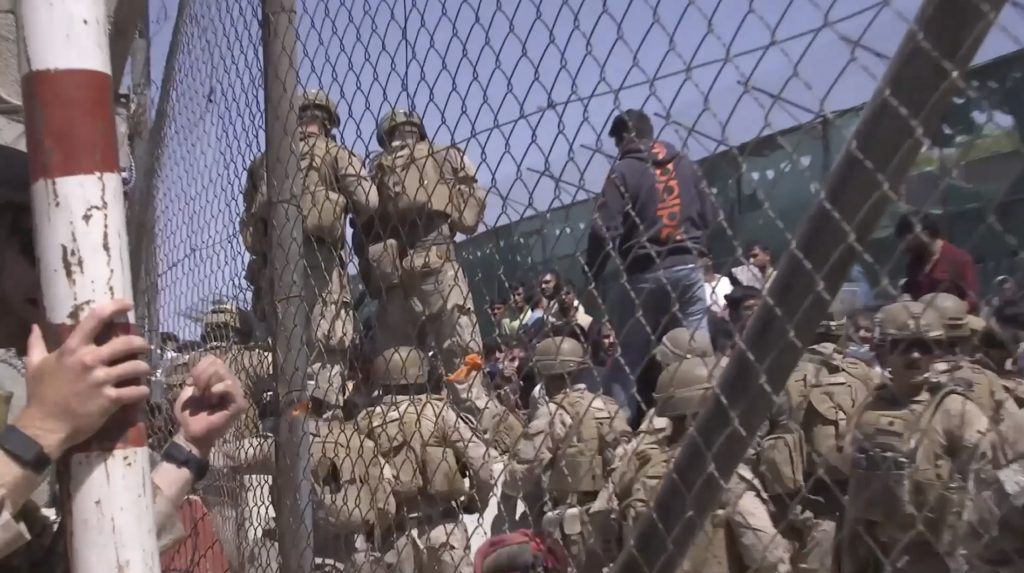Two former senior U.S. military leaders who oversaw the United States’s withdrawal from Afghanistan in August 2021 are set to testify in front of a House committee on Tuesday afternoon.
Gen. Mark Milley, the former chairman of the Joint Chiefs of Staff who retired this past fall, and Gen. Frank McKenzie, the former commander of U.S. Central Command who left his position in 2022, will appear in front of the House Foreign Affairs Committee. While both leaders have testified in front of Congress in the past, it will be their first time as retired officials, which could allow them to speak more freely.
Tuesday’s hearing is the latest development for the Foreign Affairs Committee’s investigation into the Afghanistan withdrawal. Chairman Michael McCaul (R-TX) started the investigation once the GOP gained the House majority in the 2022 midterm elections.
“On April 14, 2021, President Biden announced the United States would unilaterally withdraw
its military forces from Afghanistan. For months before that announcement, the intelligence community and his senior military advisers, including both gentlemen testifying here today, issued dire warnings about the withdrawal’s consequences,” McCaul will say during his opening remarks, according to a copy obtained by the Washington Examiner.
Biden went against Milley and McKenzie’s advice when he announced his decision to pull U.S. troops out of Afghanistan. His administration maintains that the president’s hands were tied due to the Trump administration’s Doha Agreement, which was a deal with the Taliban that mapped out their exit from the war. Others have argued that the Taliban hadn’t lived up to their side of the bargain anyway.
A House Foreign Affairs Committee majority aide told the Washington Examiner that Republicans are hoping to demonstrate multiple points through the hearing. One of which is that Biden went against the advice of his top military advisers, while another is that the administration should’ve been more prepared for the Taliban takeover.
The Taliban carried out a military offensive throughout the country, regaining territory in part without fighting against the U.S.-backed and trained Afghan army, which at times put its arms down willingly. Defense officials have since acknowledged the difficulty in accurately calculating a military’s willingness to fight.
The Taliban overtook Kabul, the capital of Afghanistan, on Aug. 15, and as McCaul contends, the State Department declined to call for a noncombatant evacuation operation, or NEO, which the military would conduct, until it was too late.
“Our investigation has uncovered repeated instances of the White House refusing to listen to warnings about the situation on the ground in the country,” McCaul’s written opening remarks say. “Additionally, the committee has learned the State Department did not request an emergency evacuation until after Kabul was surrounded. As a result, it took until Aug. 17 for the airport to be secured so U.S. personnel and equipment could get on the ground to begin an evacuation.”

With the Taliban having overthrown the U.S.-backed Ghani government, the U.S. military began an NEO out of Hamid Karzai International Airport. Tens of thousands of Afghan civilians swarmed the outer gates of the airport, desperately hoping to get on one of the aircraft out of the country every day for the latter half of August.
On Aug. 26, 2021, an ISIS-K terrorist, who was released from an Afghan prison by the Taliban only days earlier, detonated a suicide bomb outside of Abbey Gate at the airport. Thirteen U.S. service members were killed in the blast. Roughly 170 civilians were killed as well. Dozens of other U.S. troops were wounded in the blast.
The aide noted that the other goals the committee is hoping this hearing will accomplish include detailing what they described as the State Department’s failure to plan for an evacuation, as well as the Pentagon’s, including Milley’s and McKenzie’s, mistakes that led up to the withdrawal and the decisions that led up to the bombing.
Last March, Marine Sgt. Tyler Vargas-Andrews emotionally recounted the bombing, in which he lost an arm and a leg, when he appeared before the committee. He told lawmakers that he believed he identified a suspect who met the intelligence description they had of the would-be bomber but that his commanding officer did not give him the green light to engage the target.
Shortly after Vargas-Andrews’s testimony, McKenzie told the Washington Examiner that he was “not aware of any reporting from any source any time that would corroborate” Vargas-Andrews’s testimony.
Vargas-Andrews was not interviewed in the department’s initial investigation.
Gen. Michael “Erik” Kurilla, the commander of CENTCOM, directed U.S. Army Central Commander Lt. Gen. Pat Frank last June to review public testimony from service members about the bombing in the aftermath of Vargas-Andrews’s claims. The additional review concluded and Secretary of Defense Lloyd Austin and Kurilla have been briefed on the findings, CNN reported last week.
The U.S. military, fearing a second ISIS-K attack at the airport, carried out an airstrike targeting a humanitarian aid worker whom it believed to be a terrorist who posed imminent danger to the troops at the airport. The aid worker was killed, as were about 10 others, including his children.
Lt. Gen. Sami Said, the U.S. Air Force inspector general, investigated the strike and concluded there were no illegalities, and no one was disciplined for it.
McCaul, over the course of the committee’s investigation, has frequently sparred with the State Department over access to specific documents related to the withdrawal.
CLICK HERE TO READ MORE FROM THE WASHINGTON EXAMINER
The White House has largely tried to avoid revisiting the withdrawal and to downplay the chaos that occurred, which has prompted criticism from GOP lawmakers as well as family members of those who were killed in the Aug. 26 bombing.
One Gold Star parent, Steve Nikoui, whose son Lance Cpl. Kareem Nikoui was killed in the bombing, was arrested after interrupting President Joe Biden’s State of the Union address earlier this month.

